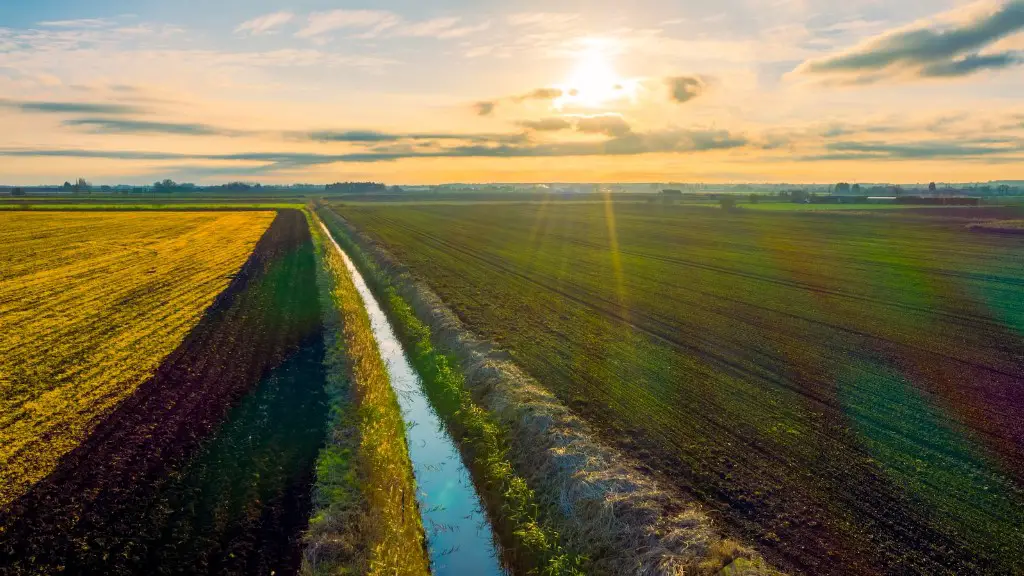Agriculture has been exempt from many environmental laws, including the Clean Water Act, for decades. This exemption has led to widespread environmental degradation, including water pollution, soil erosion, and habitat loss. The agricultural exemption is one of the many ways in which our food system is unsustainable.
There is no definitive answer to this question since agricultural exemption from Eld vary from state to state. However, in general, most states do exempt agriculture from Eld regulations.
What qualifies as ag exempt fmcsa?
The private transportation of agricultural commodities is only allowed if it is done by the owner or operator of a farm or ranch. This includes transportation of livestock, bees, horses, fish used for food, and other commodities that meet the definition of “agricultural commodity” under $ 3952.
The agricultural exemption is a special consideration that allows carriers of agricultural commodities to be exempt from keeping Hours of service and using Electronic logging devices (ELDs). There are certain conditions that qualify a driver or carrier for using this special exemption, such as:
-The driver is transporting agricultural commodities that are produced by the farm that employs the driver;
-The driver is transporting agricultural commodities that are to be used for farming purposes;
-The driver is transporting agricultural commodities that are to be sold at a farmer’s market;
-The driver is transporting empty containers that have previously been used to transport agricultural commodities;
-The driver is transporting livestock.
What business practices are exempt from ELDs
The short-haul, timecard exceptions are for drivers who:
-Make deliveries and returns within a 150 air-mile radius of their normal work reporting location
-Keep time records that show when their daily duty period starts and ends
-Are off duty for at least 8 consecutive hours between each 12-hour shift
-May be on duty up to 60 hours in any 7-day period, as long as they take 34 or more consecutive hours off duty at the end of each 7-day period
There are a few trucks that are ELD exempt, but most of them are engines manufactured on or before 2000. If a commercial motor vehicle carrier has an engine manufactured on or before 2000, then the vehicle is ELD exempt. An ELD needs an engine control model (ECM) and most engines manufactured prior to 2000 do not have an ECM.
Is logging considered agriculture?
Many statutes already recognize timber harvesting and logging activities on a comparative basis with Agriculture, and our classification in the North American Industrial Classification System (NAICS) Code 1133 falls under agriculture. This argument is valid and should be considered when making decisions about timber harvesting and logging activities.
An agricultural commodity is defined as any agricultural product, unprocessed food, feed, fiber, or livestock. This definition includes livestock as defined in the Emergency Livestock Feed Assistance Act of 1988.
What is a Class G exemption?
If you are the owner of an unoccupied dwelling where occupation is prohibited by law or by planning restriction, you may be eligible for a Class G exemption from Council Tax. This exemption is granted at the discretion of the local authority and may be subject to certain conditions.
The term ‘air mile’ is actually defined internationally as a ‘nautical mile’, which is equivalent to 6,076 feet or 1,852 meters. Therefore, 150 air miles are actually equivalent to 1726 statute miles.
What is agricultural truck driver
A truck driver is responsible for ensuring that products are safely delivered to their desired locations. They are the point of contact for receiving, transporting, and delivering products within the ag industry. Truck drivers play a vital role in the ag industry and are essential for ensuring that products are delivered safely and on time.
There are a few drivers who are exempt from using an ELD. These drivers include those hauling livestock or insects, drivers of vehicles older than model year 2000, and drivers with the original engine in their vehicle. However, this is subject to change as the FMCSA continues to monitor these exemption cases.
Do livestock haulers have to use ELD?
As of April 1, 2020, transporters of livestock and insects are not required to have an ELD. This exemption applies to transporters who haul livestock or insects in a vehicle that is used exclusively for that purpose and is not used to haul other commodities.
There are many reasons why you need an ELD in your vehicle. First, the ELD automatically records your driving hours and sends the data to your carrier, so you don’t have to worry about keeping track of your hours manually. Second, the ELD is more accurate than a paper logbook, so you can be confident that your hours are being recorded accurately. Third, the ELD helps you stay compliant with the hours-of-service regulations, so you don’t have to worry about being cited for violating the rules. Finally, the ELD makes it easy for your carrier to monitor your hours and make sure you’re not working too much, which is important for your safety and the safety of other drivers on the road.
Do I need a ELD under 26000 lbs
Hi there!
As you may know, the FMCSA has mandated that all commercial trucks must have an ELD, or electronic logging device, as of December 18th, 2017. However, there are a few exemptions to this rule.
If you are a driver who is operating under short-haul operations, you are exempt for CDL and non-CDL vehicles, and you are not required to keep a record of duty status (RODS). This exemption only applies if you meet certain conditions, so be sure to check with your carrier to see if you qualify.
We hope this information is helpful. Drive safe!
Are small trucking companies exempt from ELD?
The ELD Final Rule requires commercial interstate truckers, bus drivers, and most motor carriers to install and use electronic logging devices (ELDs) to record their hours of service (HOS). The rule also applies to those who meet the requirements based on weight or activity to record duty status information. Carriers who use paper logs or automatic on-board recording devices (AOBRDs) must switch to using ELDs no later than December 18, 2017.
This is an important distinction to make because it can have implications for things like taxation and zoning laws. If something is considered agricultural work, it may be subject to different rules and regulations than if it is not considered agricultural work.
Does lumber count agricultural
The US timber industry is a crucial component of agriculture with significant contributions to our nation and the world. Some facts about the US timber industry include: There are 823 million acres of forests and woodlands in the US. Timber industry employees number around 564,000, with 2/3rds being employed in forestry and logging and the remainder in wood products manufacturing. The US is a world leader in softwood production, with a 25% share of the global market. The industry generates $200 billion in economic activity each year and is responsible for over 4% of the nation’s GDP.
There are four main branches of agriculture, including livestock production, crop production, agricultural economics, and agricultural engineering. Each branch covers a different area of specialization within the field of agriculture.
Warp Up
No, agriculture is not exempt from ELD.
There is no one-size-fits-all answer to this question, as the exemption from eld for agriculture depends on a number of factors, including the type of agriculture being conducted and the location of the farm. However, in general, agriculture is exempt from eld if it is being conducted for profit and if the farm is located in an agricultural zone.





